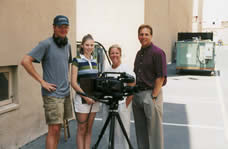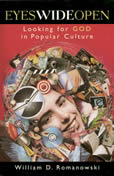By Melissa Slager '01

The video production crew of Rob Prince, Tara Romanowski, Brenda Bos
and Bill Romanowski in Hollywood.
Squatting on the carpet as wife Donna and daughter Tara lounged on the couch, Communication Arts & Sciences professor Bill Romanowski took in the latest emanations from the family television.
“Oh, gross!” cringed Donna, who also works at Calvin for the Center for Christian Scholarship.
A coffin full of snakes filled the screen crawling over a member of the latest “reality TV” show, “Fear Factor.”
Tara, 14, had just flipped to the NBC channel from ESPN’s All-Star Home Run Derby (she and mom are baseball fans). Her father claimed they were obligated to watch the show—have to see what those college kids are watching these days—and it was purely for research. Uh huh.
Back to the homerun derby.
“Who’s that?”
“Giambi. He plays for the A’s,” Donna answered her husband, then spewing stats on who led the Major Leagues in homeruns.
Bill was more interested in a trailer for “Planet of the Apes,” however, asking Tara if she’d like to see the movie re-make with him when it came out in theatres in late July.
“Um, maybe.”
Perhaps she was remembering a recent ’NSync concert with her dad, after which he analytically grilled her on the roles of the scantily clad female dancers.
Such is the way many evenings go for the Romanowski family (minus 17-year-old son Michael who works at West Michigan’s largest movie theatre, Studio 28).
Approaching popular culture—from television to film to music—with a critical Christian eye, Bill Romanowski isn’t one to leave his work entirely at the doorstep.
And neither should other Christians.
In his latest book, “Eyes Wide Open: Looking for God in Popular Culture” (Brazos Press, 2001), Romanowski points to the fact that many believers consume what is offered on television, on movie screens, on CDs and on the Internet without so much as a thought on its faith value.

Others condemn all popular art forms and still others appropriate it for their own means, a “Christianized” version of what the “secular” world offers.
“Eyes Wide Open” argues for a Christian approach to popular culture that takes it critically head on, looking to preserve the good, improve the bad and get rid of the ugly.
Many evangelicals think art is only Christian if it is explicitly about God, Romanowski said.
“They make faith the issue in art, which I think is propaganda, instead of faith being the context for the art.”
The Christian view of culture that Romanowski lays out in “Eyes Wide Open” is one “that’s getting at faithfulness in popular art,” he said.
It’s a message that both lay people and those in the biz are taking to heart.
The book—which has drawn praise from Tony Campolo to Ralph Winter—will be taught this fall in a new course for first-year students at Calvin called “Prelude.” This summer, Romanowski worked with Rob Prince, Calvin’s video producer, and other college staff to develop a three-part video series to accompany the reading.
He flew to Hollywood to help with shots of movie studios and the surrounding area to accompany words he recorded earlier.
Romanowski has been on location at that gilded mecca countless times now for teaching and speaking, flying out there almost every year.
But he didn’t always make it to the film capital of the world as many as three times a year (as he did last year).
“Before I went to college, the furthest I was ever gone from home was two hours,” he said. Even then, Indiana University of Pennsylvania was only about five hours from his hometown of Wilkes-Barre, Penn.
He never foresaw popular culture studies as the field he would soon become synonymous with at Calvin, especially in a college climate that at that time was “more interested in high culture than popular culture.”
Instead, moving toward his vocation was a “step-by-step” process.
“I grew up watching television, saw the Beatles on Ed Sullivan, went to the movies pretty regularly. I didn’t think about it much. I just did it more for social activities,” he said. “But oddly enough, you remember that stuff later on.”
He took one undergraduate course on film through the English department that focused on titles such as “Birth of a Nation.” He also made a short film with friends outside of classes.
“So probably these things were there before I became real conscious of it,” he said.
Things became clearer when he started 12 years worth of campus ministry with the Coalition for Christian Outreach.
“That’s when you begin to realize how important popular culture is to college students,” Romanowski said.
During the 1980s, he produced, wrote and starred in a one-man musical that followed a character living out his rock-‘n’-roll dreams with impersonations of everyone from Elvis to Devo. The show took him across North America and became the impetus for his decision to leave English and study American culture at Bowling Green State University.
By the time he came to Calvin with the Center for Christian Scholarship in 1988, people started taking notice—including Randy Bytwerk, then-new chair of the CAS department.
“He was simply too good to let him get away,” Bytwerk said. “There had to be a way to keep such a capable and unusual person here at Calvin.”
Administrators were convinced, and a one-year term soon led into a tenure-track position. While serving on a curriculum review committee, Romanowski helped develop his own niche with a film studies concentration, as well as a course that still is among the department’s most popular offerings, “Communication and Culture.”
Stephanie Sandberg, a colleague who has taught that course with Romanowski, said it is representative of what her “mentor” has brought to the college as a whole.
“From what I understand, the rest of the world had been studying popular culture for quite some time, but Christians weren’t really ready to do that,” said Sandberg, who came to Calvin six years ago.
Calvin was among those Christian institutions concerned over whether rock, film and television constituted a “viable” field of study.
“(Romanowski) made it possible to study all those things,” she said.
In “Communication and Culture” and film-studies courses alike, the majority of student response to Romanowski has been praiseworthy.
Bytwerk said it always is “a pleasure” to read the evaluations students write on Romanowski, some saying the professor is the reason a person should come to the college.
Of course, there’s always one or two who see things differently.
“He’s got a strong and passionate approach. Invariably that’s going to surprise some students, who think he’s coming off a bit too strong,” Bytwerk said.
“I tell him that’s to keep him humble. We all need a reminder that total depravity didn’t escape us,” he added with a smile.
But for the colleagues, students and acquaintances in the majority, Romanowski is a “genuine” and “nice” person who has an “intelligent” and “distinctly Christian” approach to popular culture.
You could very well add “contagious” to that list, too.
Since publication of “Eyes Wide Open,” it seems Romanowski has sparked his own small wildfire among Hollywood’s Christian contingent.
Some are those who once studied under him at the college.
Brad Bergman, ’94, worked for six years at Disney and is now a freelance designer and photographer in Los Angeles.
“How do we as Christians look at the culture and not be afraid to take it head on?” he said, recalling the question that gave rise to Romanowski’s lessons.
In Hollywood, a Christian approach to popular culture is especially important, “because about everybody out here is affected by it,” he said.
“A lot of Christians in Hollywood take the approach of going in and converting people, and I think that’s really counterproductive,” Bergman said.
If nothing else, it serves only to feed the media stereotype of Christians as “hit-you-over-the-head Bible thumpers,” he said.
The better approach he learned from Romanowski, he said, is one that is “transformational” and sees faith as something that “seeps into every area of your life.”
The fact of the matter is, Christians aren’t just working for shows like “Touched by an Angel,” Bergman said.
In the case of Brenda Bos, they’re also working for Warner Bros. and its TV sitcom, “Nikki.”
The production manager, who also was a coordinating producer for “Suddenly Susan,” said she recently re-read “Eyes Wide Open” (which she endorsed) and also read most of an earlier book Romanowski wrote, “Pop Culture Wars.”
Through a connection at her mother’s church, she now speaks to Romanowski’s students for an interim course he teaches periodically in Hollywood.
Bos was “sort of surprised” when she first came upon his work.
“I was in the Christian Reformed community until the mid-80s and it was really conservative and people were very opposed to the media,” she said.
She was “adamantly opposed” to going to a college affiliated with the Christian Reformed Church, and Calvin didn’t have much of a TV program at that time anyway, she said.
So she was first of all surprised that someone in the Christian Reformed circle was addressing media in the first place, she said, and then shocked to see it was “good” talk that looked at media “with compassion and intelligence.”
“I’m sort of pleased to know there’s a professor of Calvin who is encouraging the young people to look at media in a Christian way and not have the first thing be, ‘You can’t watch this.’ … It’s, ‘Let’s look at this intelligently.’”
While Calvin wasn’t for her years before, Bos said it’s now a college she’d recommend.
“I really never knew there were guys this cool at Calvin. … Without knowing him before he’s really become kind of an ambassador for the school,” Bos said.
But it isn’t just Calvin grads and those familiar with the Christian Reformed tradition that Romanowski is reaching.
Ralph Winter, producer of “X-Men” and more recently “Planet of the Apes,” said he came to know Romanowski through “Eyes Wide Open,” which he also endorsed and is now re-reading.
“It’s important because I think he lays out a framework for Christianity and media and how they intersect and collide,” said Winter, a member of a Presbyterian church who has produced in Hollywood for 20 years now.
“I work in this business, so I don’t always get into the critical or analytical view. I’m busy with stories. Bill forces me to take a step back a bit and take a broad look at what we’re doing.”
Back in Grand Rapids, Romanowski said he’s starting to notice the attention, getting calls for interviews and speaking engagements.
This year he again traveled to Amsterdam and England for a seminar and festival.
Earlier this year, he spoke at a college in Oregon and, “to make a long story short,” two people came to the lectures that had last heard him as high-school students over 20 years prior in California.
“You find yourself in some strange speaking places,” he said.
With the ever-changing ins and outs of popular culture, Romanowski’s sure to have plenty of projects to keep him busy in the future, too.
“You just keep learning about it,” he said.
He hopes to pick up research again this fall that focuses on Protestant groups that have had an influence on the media, a book that would be geared at a scholarly audience.
His home office, where he often sits down to write, is decorated with framed movie posters: “Pulp Fiction,” “Silence of the Lambs,” “Rocky,” “Dances With Wolves.”
In the corner is a smaller poster of the rock-‘n’-roll musical he performed during graduate school, a reminder of how it all started.
A younger Romanowski wails on a guitar ala Bruce Springsteen. “He’s got a musical diary of unfinished dreams…” the caption reads.
For the professor now entering his fourteenth year at Calvin, things are just starting in what is more a reality-based drama.
Only without the snakes.